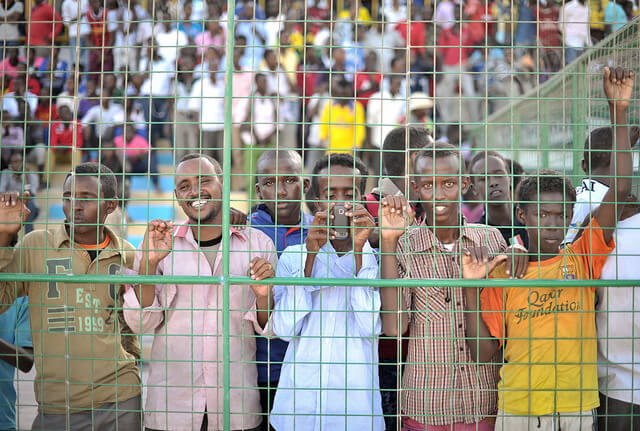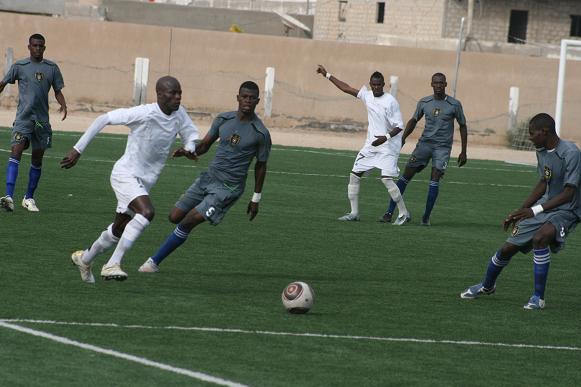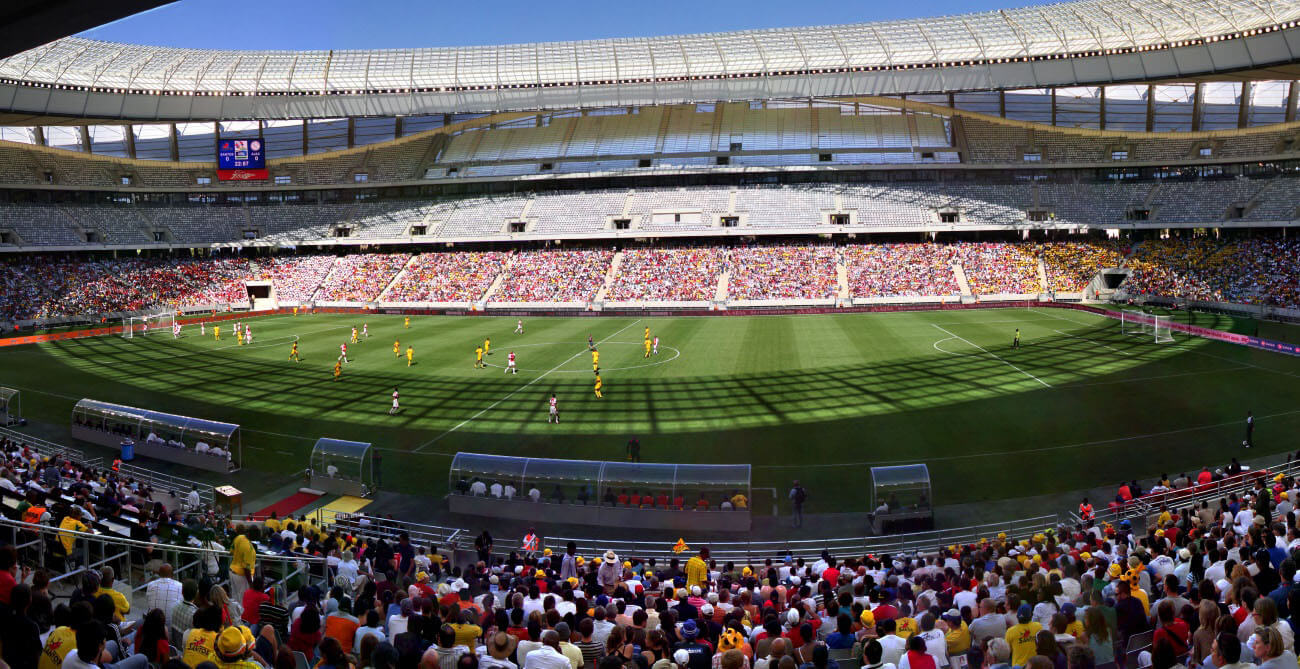“Soccer isn’t like a religion in Africa. It is bigger than religion.”
– Archbishop Desmond Tutu
Africa has a large and extremely passionate football following. Confederation of African Football (CAF), the governing body of African football, includes all African countries and who all run their local league systems. This means over 50 local football leagues are run across Africa.
Whether in slums, villages or cities, it is commonplace to see agile Africans, young and old, kick a football around whether for fun or at locally organized football games. Asides this, football clubs around the world receive massive followership across Africa and it is not uncommon to see Africans, both young and adult don jerseys of different football teams. About 260 million Africans follow the English Premier League (EPL).
However, with such passion for the game by Africans and the tens of football games happening across stadiums, one would assume that stadiums would be filled up every weekend, but the reverse is the case. Even the continental champions’ league (CAF Champions League) does not command enough attention than a regular friendly football match in one of Europe’s top 5 leagues.
What is wrong with African football?
FANBASE & ATTENDANCE
Fans are the lifeblood of football. So far, fans are not getting enough delight watching African football. In the 70’s when cable TV was less common and barely affordable, Africans turned to local leagues and the followership was intense. However, local leagues lost their place in the hearts of fans as the fans got more exposed to foreign football on a more regular basis. Unfortunately, matches also held on the same day and roughly similar hours with the elite league. African football leagues were at the losing ends.

Young men watch a football match in Mogadishu, Somalia. PHOTO / Tobin Jones
Attendance at local football games are terrible. League games are played consistently with little or no fans at stands. Clubs only experience a surge in attendance when a local derby is being played. The absence of fans means clubs get little or nothing in ticket sales which is usually one of the biggest revenue sources of football clubs. The English Premier League records an attendance average of 36,000 every game. Arsenal football club with a 60,000 capacity stadium recorded 100 million pounds in ticket sales in 2014 and the club with the least revenue from ticket sales still managed to scour 6 million pounds. The highest earning recorded per game by an African football league is set by South African Premier Soccer League at 6,000 pounds. Other leagues barely feature in this least as they pose insignificant figures. Clubs must begin to act like the commercial enterprises that they are. The fact that a number of African clubs are funded by the government reduces the quest to be profitable as they are certain that whatever happens, they will be paid from government coffers.
MERCHANDIZE AND SPONSORSHIP
Because fans no longer follow the local leagues keenly, clubs are unable to make impressive sales with club memorabilia. Similarly, sponsorship remains difficult to come by as clubs do not have the required followership to pull impressive deals. An average English football club generates more revenue from merchandize sales and sponsorship deals than it gains from ticket sales. Due to the lack of structure to retain and grow fans, African league clubs lose a lot of potential revenue.
TV Rights
Attendances at the stadiums remain the biggest revenue source for most clubs around the world, however since not everyone can make it to the stadium, broadcasting companies bid for the right to show league games live on television. Thus, league management agencies sell TV rights to broadcasting companies and such revenue is shared among league clubs. Asides from viewing at home, there are a number of countries where fans patronize local football viewing centres to watch foreign leagues.
African league clubs lag behind in terms of TV deals. Supersport is arguably the biggest tv rights buyer in Africa. South Africa pulls the highest revenue from TV rights with 134million USD for a five year television right to Supersport. While Zambia sold off 5 year TV rights for 5 million USD, the Nigerian Premier League was able to bag 34 million dollars for the same period. Zimbabwe Premier Soccer League sold off its TV rights at 1 million dollars a year. Kenya, Angola, Ghana are among other countries who have manage TV rights deals with Supersport.
However, the revenues are still meagre when compared to the elite leagues across the world. The English Premier League, with the 20 clubs now earning an average of around £155 million per season. The domestic rights alone, which were sold in 2015, had Sky Sports and BT Sport paying £5.14bn between them. Even Supersport paid 408 million dollars to air the English Premier League in Africa.
PLAYER DRAIN
Due to the slow growth of African football leagues, players who have excelled for their local teams are quick to jump on a plane to Europe for a trial. Several only get a trial with some of Europe’s smallest clubs. Despite this, it offers a significant improvement to what is obtainable in top divisions in Africa. The low turnover experienced by African clubs ensure that players earn very little salaries, and are unable to train in standard sport facilities. Thus, players seek greener pastures, both to improve their level of play and to raise their income. The exodus of these players in return causes more harm to the league as the quality of play in African football leagues drop significant every time a quality player leaves.
A PACE SETTER
The Egyptian league is regarded as the most valuable league in Africa. With a market value estimated at €105.65 million, the Egyptian league’s value is €18.37 million more than the second-placed Absa Premiership, which is valued at €87.28 million. Al Ahly, who won the CAF African Club of the Century in 2000, are leading the pace when it comes to creating a reputable football brand. The team holds the record for the most official international tiutles won globally and holds at least 13- official trophies in its cabinet. The club has enjoyed credible sponsorships from multinationals across the world which includes Etisalat, Chevrolet, Pepsi and Egyptian beverage company, Juhayna. It also recorded at 30 million dollar deal with Saudi Arabia’s Sela Trading Company. It is the biggest deal in Egyptian football history.
Al Ahly’s commercial success is a result of incredible organization and strategic planning coupled with on field success. The club operates on similar levels with European teams as opposed to many other clubs that are run haphazardly. African clubs can take a cue from Al Ahly and this would not only bring more revenue, it would ensure African football can now develop to the point where millions of fans now look forward to the next football game.

Photo: Flickr / Magharebia
CONCLUSION
European teams have successfully glamorized local and international competitions and have also built a fortune around them. There has been an increase in the quality of the football pitches, strategic planning and execution of football competitions. African teams must think of football as a product that is commercially viable and must act strategically to ensure profitability.
Football associations must do a makeover for local leagues and restructure the way it is being run. Brands must be created around football teams. Scheduling of football games must be more strategic, quality of officiating improve and the stadium violence and corruption reduced, if not eliminated. If sufficient efforts are made to develop and promote African football, there will be more inflow of sponsorship deals and revenue that will ensure players earn better salaries, infrastructure are upgraded and clubs have more spending power. It could represent a significant improvement on African economies.

